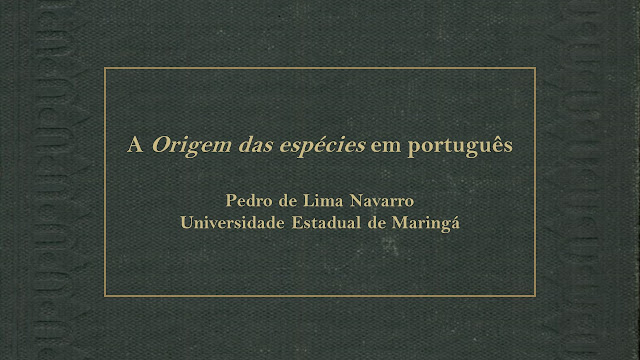Shillingsburg (2006)
Capítulo em Texts in multiple versions (2006).
·
Peckham
não produziu uma edição crítica, mas uma texto variorum. Considerava os textos
originais como edição crítica editada pelo próprio darwin acreditando terem
sido feitas a partir do mesmo type, ou seja, reimpressões não edições. Ele
estava errado, pois, salvo alguns pontos, o texto foi resetado em cada edição.
·
Cada
reset potencialmente incluía novos erros de edição em conjunto com as mudanças
requisitadas por Darwin.
·
Problemas
editoriais quanto ao valor artítistico e autoridade textual da origem. O autor
considera o texto mais cientifico (expositivio) do que artístico (persuasão).
o
The ordinary consequences of seeing the document
as science are clearly evident in the Preface to the Oxford University Press
reprint of the 6th edition in 1951, written by Sir Gavin de Beer:
“It has been said that the first edition is the most valuable because so many
of the additions which Darwin subsequently incorporated in the book were
occasioned by criticism now known to be groundless. . .” (xi).5 But to justify
his choice of the 6th edition, de Beer adds, “. . . the first edition of Origin
contains certain arguments based on views which have been outgrown by modern knowledge,
and therefore there is no reason to prefer the first edition to the sixth on
this score” (x). Taken together these two statements, perhaps inadvertently,
suggest that the first edition is full of exploded scientific ideas and the
subsequent editions waste time on trivial groundless counter arguments. In
hindsight, such “reasoning” seems just silly. But it is clear that the book’s
scientific purposes justify our asking if it presents the world of scholarly
editing with a special case, especially if one’s experience as an editor is with
religious or literary texts, not scientific ones. In explaining the rationale
for his 1959 variorum text, Morse Peckham said: “from the point of view of the
history of science or the history of ideas or the history of culture,
scientific works are just as important [as literature], and perhaps more so.
Extensively revised texts are indeed even more common in science than in
literature, especially since the immensely accelerated rate of scientific
change began to show up about a century and a half ago. two centuries ago, we would have to say now]
[essa ultima frase tem aplicação com a tradução de certas eds] (11). 223
·
Nota
6 e 12 contém proofs do texto
·
Sobre
o tal reset
o What
actually happened is that, with the exception already mentioned, each edition
was completely reset, albeit line for line. Brief departures occur in those
passages where Darwin had made changes that prevented an exact line for line
imitation of the previous edition and in other places where the compositors
thought end-line hyphenation or a tight line could be improved by changing the
lineation. Thus, while the printers at William Clowes, one of London’s largest
printing companies, were clearly professional and very accurate, it is patently
the case that compositors were more than likely responsible for most of the
changes in accidentals — punctuation, word division, italics, capitalization,
etc. Understanding that, during the eleven years from 1859 to 1869, when the
fifth edition was produced, the book was completely reset each time makes it
easier to fathom the statistics Peckham gives for the first six editions: […]
226-7
o Knowledgeable
students of Darwin’s texts repeatedly complain about editions, both in print
and on the Internet, which silently combine the text of the first edition with
the Historical Sketch from the 3rd edition
or that give the text of the 6th edition
and declare it to be the book published in 1859. One wonders why these
inaccuracies about history seem not to matter to people supposedly interested
in the history of science. Unfortunately it is not just the ersatz editors, the
enthusiastic amateurs with confused thinking, and those with Internet access
that distribute their confused thinking in misleading and unhelpful editions.
Academic and commercial publishers have also failed to engage Peckham’s insight
already quoted: “Extensively revised texts are indeed even more common in
science than in literature....” (11). 227-8
·
O
caso aqui é da autoria de Darwin quanto a todas a mudanças, sendo que algumas
provavelmente foram inseridas pelos typesetters
·
Edição
acadêmica não vai atrás do melhor Darwin, mas sim mostrar o processo de
pensamento e interação com os leitores do autor e o processo textual do autor
com todos seus desvios e complexos sociais
·
Consideração
sobre o elemento retórico pensando no público ao invés de apenas um pensamento
científico.
o Evidence
of such calculations can be considered false starts or clippings on the
workshop floor. I resist analogies with carpentry or sculpture here, where we
can talk about shavings and marble chips as meaningless detritus to be swept up
and thrown away. Writing is not like that. Every text ever attempted was driven
by an impulse toward the work; even when it is almost instantaneously withdrawn
and substituted, it remains as a telling stroke revealing some aspect of
calculation or some process of thought which the student of the work might find
illuminating as he watches the author working through a process towards the successive points of release to the public.
229-30
·
O
holografo e scribal de Darwin estão perdidos
·
Em
qualquer trabalho com múltiplas edições, o público tem poder de alterá-lo.
Várias questões editoriais que derrumbam a ideia de uma aproximação a um texto
ideal
·
Meditar
sobre os últimos 3 parágrafos 231-2
·
Apêndice
A mostra uma visão interessante do processo editorial de Darwin e da origem
como um todo, mostrando que não houve stereotype e que as edições foram sim
resetadas. Isso se relaciona com Murray. Darwin não podia revisar a segunda ed
totalmente, então se assegurou que o processo de typesetting não fosse muito
alterado.

Comentários
Postar um comentário